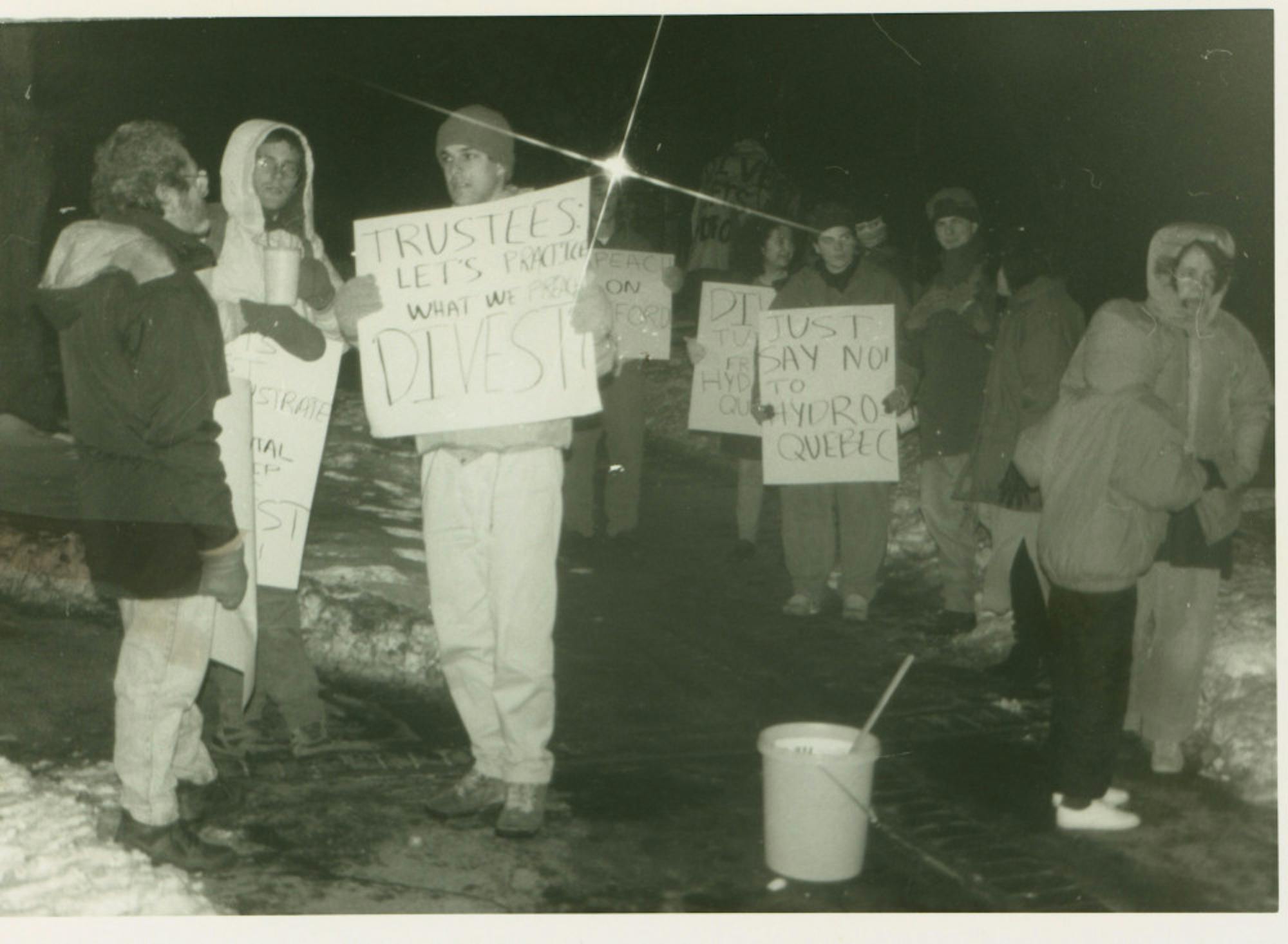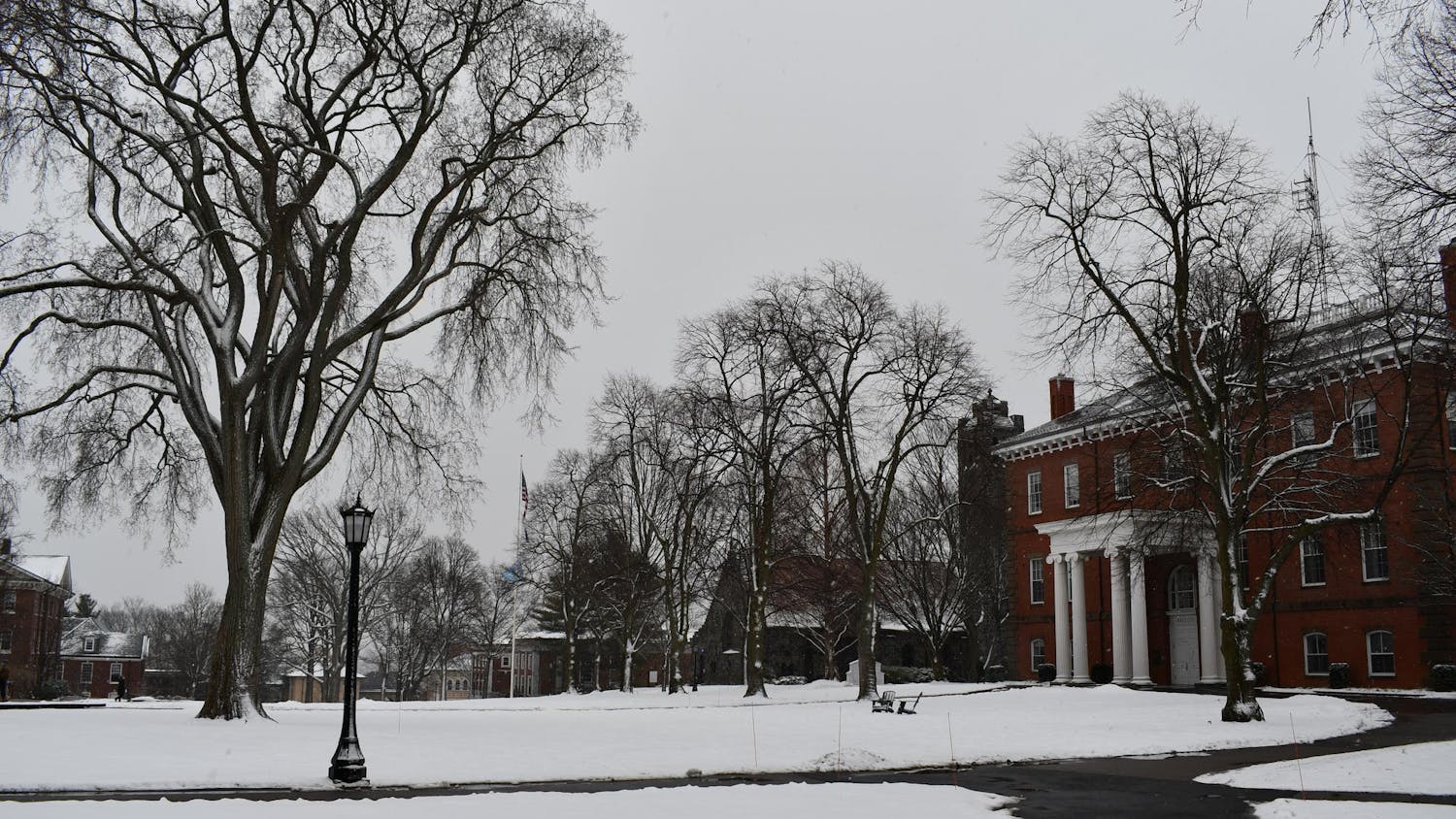Social and political activism have been integral parts of Tufts' campus culture for generations. Since its founding in 1980, the Daily has been covering campus activism in its many forms for various issues throughout the years. In commemoration of its 40th anniversary issue, the Daily is highlighting the most memorable moments of student activism captured in print since 1980.
1980s
In its inaugural issue, published on Feb. 25, 1980, the Daily covered a tuition protest ofhundreds of students who objected to the proposed $1,126 tuition hike.
In 1982, students ralliedon a day that the Board of Trustees gathered on campus for a meeting to demand that Tufts divest itself from companies producing nuclear weapons.Students, faculty, clergy and administrators attended and voiced their concerns about the nuclear arms race and Tufts' implicit participation in it.
In 1987, then University President Jean Mayermarched inCumming, Ga., as part of one of the largest civil rights demonstrations in the South since the 1960s Civil Rights Movement.Mayer’s march led to a call by Afro-American Society President Arnold Kee for greater on-campus activism. Additionally, Keeadvocated for the hiring of a minority recruiter in the admissions office after the position was vacated at the end of August 1986.
1989 saw Tufts students gathering at the John F. Kennedy School of Government at Harvard University, along with more than 50 special interest groups and other college students, to protest the appearance of Mobutu Sese Seko, president of Zaire. Students showed up to oppose the human rights abuses in Zaire, which is now the Democratic Republic of the Congo, and Mobutu’s support of South African apartheid.
1990s
During a Catholic mass at Goddard Chapel in 1990,eight students staged a silent protest of the Catholic Church’s position on AIDS and attitude toward LGBTQ individuals. Most students involved were openly gay and wore t-shirts that said “Silence = Death.”
In 1994, a group of students and faculty, called the Tufts Coalition for Peace,organized a protest at an event where former President George H. W. Bush spoke on U.S. foreign policy in the Persian Gulf during his administration. They did not claim to oppose his right to speak, but rather objected to the foreign policy pursued during his presidency.
Later that year, students attended a Trustee committee forum to demand divestment from Hydro-Quebecfollowing a rally in front of the Jumbo statue.Hydro-Quebec is a Canadian energy company which was criticized at the time for disrupting and displacing Cree and Inuit peoples.
In 1996, members of Tufts’ African American and Asian American communities demonstrated at a Tufts Community Union (TCU) Senate meeting to protest the Senate's decision to remove culture representatives from its body, thereby making it less diverse and representative.
Tufts workers led campus activism at the beginning of the 1997 school year in opposition to Tufts’ decision to transition from their previous cleaning service, the UNICCO Service Company, to the International Service System (ISS). The switch was for cost savings reasons, but it caused 110 UNICCO workers to lose their jobs.
In 1997, it was discovered that Trustee Monte Haymon was involved with Sappi Ltd., a South African paper manufacturer that was under attack at the time for its labor policies in both the U.S. and South Africa as well as its violations of safety, health and environmental standards. Approximately 75 student activists from the Massachusetts area protested outside Ballou Hall in conjunction with the Mass. Jobs with Justice coalition.
2000s
The beginning of the 2004 school year saw the addition of a Tufts branch of the national Socialist Alternative organization. The Socialist Alternative had groups at other colleges, including Harvard, and gathered student socialists as well as coordinated student walkouts and participation in national protests.
In 2007, former Harvard University President Lawrence Summers was slated to speak at Tufts, but both faculty and students protested his coming.Summers was controversial for his alleged views on race and gender.
Students took part in the Day of Silence in 2009, an annual national silent protestagainst the mistreatment of the LGBTQ community.
Also in 2009, hundreds of students, faculty and staff gathered at a rally on the patio of Tisch Library in response to hate crimes against minority groups on campus. They demanded that the Tufts administration take action to prevent the continued displays of hate on campus. The rally was organized after a drunken first-year yelled racial slurs at members of the Korean Students Association who were practicing for a cultural show.
2010s
In 2010, Tufts Hillel entered a partnership with Repair the World, a national organization focused on promoting student activism among Jewish American college students on campuses across the country.
Later that year, members of the Tufts community rallied at the Mayer Campus Center for Black Solidarity Day and called for the creation of an Africana Studies department in addition to other academic programs to better represent minority groups.
Activists from Tufts Climate Action participated in a sit-in protest in April 2015 to demand divestment of the university's endowment from the fossil fuel industry, but were placed on probation over the following summer. Following years of subsequent activism and steps taken by the university, Tufts decided last month that it would form an investment review committee to consider divestment from the fossil fuel industry.
Later that year, about 200 Tufts students joined a nationwide day of protest to call on Tufts to increase its efforts in combating racism on campus and in its policies. The students, organized under the name "#thethreepercent," did so to call attention to the significant underrepresentation of Black students and faculty among the entire Tufts community.
In urging recognition of the Armenian Genocide, protesters from the Tufts Armenian Clubdemonstrated in the Mayer Campus Center in 2016.
Later in 2016, faculty voted to replace Columbus Day with Indigenous People’s Day after the TCU Senate protested the celebration of this controversial holiday with a resolution asking it to be recognized as Indigenous People’s Day.
In 2018, students, including many from the trans and gender non-conforming communities on campus,demanded the installation of gender-neutral bathrooms in campus buildings. This was a multi-year activism effort, but one that culminated in 2018 when new gender-neutral bathrooms were planned for installation in Carmichael and Dewick-MacPhie Dining Centers as well as the Mayer Campus Center, and all pre-existing single stall restrooms on the Medford campus were relabeled as gender-neutral.
Much of student activism in 2019 surrounded Tufts dining workers’ contracts, which were perceived to be unfair, and negotiations for which many students rallied behind. Students created the Tufts Dining Action Coalition and organized protests, rallies and demonstrations in response to the contract renegotiation of the University’s dining workers. Ultimately, they were successful.
40 years of student activists organize, demand change

Students are pictured demanding divestment from Hydro-Quebec in 1994.





